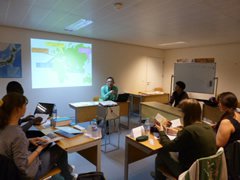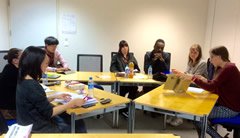The Work of Supporting The Raising of The Next
The Japan Cultural Institute in Paris
FUJIMITSU Yuko, SAITO Makoto
Latest Trends

Intensive Course 1 for Japanese-Language Master’s Student
There have been groundbreaking developments in the Japanese-language education world in France between 2015 and 2017. First, I will explain the latest trends related to our activities as Japanese-Language Specialists.
In September 2015, the first Japanese-language Master’s program in France was established jointly by INALCO (National Institute for Oriental Languages and Civilizations), one of the leading institutions for learning Japanese in France, and the Paris Diderot University (Paris 7), with the first class graduating in 2016. We provided instruction assistance from the beginning as Japanese-Language Chief Advisors with Japanese-Language Assistants, and now also run workshops for the students at the end of the school period in May after being requested to teach at the Master’s program.
An elective course on “Japanese and Japanese-language education” was also launched for third year students in September 2016 as a new program under the Japanese Language Department at the Bordeaux Montaigne University, in Bordeaux. The class has attracted highly motivated French students interested in language and cultural education who are considering teaching Japanese for secondary education as their future career path. Of those, two were selected as 2017 trainees at the Japan Cultural Institute in Paris to gain experience supporting Japanese-language education via on-site and off-site workshops under the direction of the Japanese-Language team.
The number of public secondary schools that are introducing new Japanese-language courses is also steadily increasing. In addition to Japanese being added as a third foreign language at high schools in 11 wards in Paris in 2016, the decision has been made to do so in two other regions, namely high schools in Strasbourg and at two middle and one high school in Toulouse, in 2017.
Background

Intensive Course 2 for Japanese-Language Master’s Student
Bilateral talks were held between France and Japan as part of the G7 Education Minister’s Meeting on May 14, 2016, and the decision was made to establish a new Japanese division for the French regular teacher recruitment exam (capes externe japonais). This was groundbreaking news from the standpoint that the French government had recognized the rise in those wishing to learn Japanese and the need to regularly hire new teachers.
One of two qualifications are required to become a regular full-time teacher at a middle or high school in France: Capes or Agrégation. Whereas many who seek the Agrégation certification are aiming to be academics and researchers, Capes is geared towards secondary school education. Separate qualification tests are held for each subject, and those who obtain the certification are assigned to middle and high schools in France, assuring them a lifetime official post as a teacher and government employee. In addition to English, Capes qualifications exist for German, Spanish, Italian, Chinese, Dutch, Portuguese, and Arabic, but Japanese had not previously been included. The announcement of the establishment of a qualification test for Japanese opened the door for students studying Japanese at universities in France to select teaching Japanese at middle and high schools as official government employees as a future career option.
Japanese-Language Specialists Initiatives
In order to provide support for these trends from the sidelines, the Japan Cultural Institute in Paris designed the “Intensive Course for Students Majoring in Japanese-Language Education” and accepted students recommended by INALCO (National Institute for Oriental Languages and Civilizations), Paris Diderot University (Paris 7), and the Bordeaux Montaigne University. The theme of the first session was the “design of participatory classes and the use of diverse resources.” The purpose of the session was to describe class design to achieve deep and rich learning experiences and the practical methodologies and diverse resources available to do so. Through experiencing and observing the learning activities the participants learned about activity design and the wide range of resources for the integrated instruction of language and culture. The course also has the students design their own learning activities by considering how to use the resources, and finally demonstrating their activities. In addition to classes being taught by a four-person team including Japanese-Language Chief Advisor, Japanese-Language Specialist in charge of Japanese-language courses, Japanese-Language Assistant, and full-time lecturer, we also had a special guest lecture on resource use by the chief librarian of the library at the Japan Cultural Institute in Paris. The participating students were immersed in Japanese for five days, and remained motivated and proactive until the end with no signs of tiring. They were likely encouraged by meeting others of their generation with the same aspirations from other universities. The course included ample time for pair work, group work, and discussions between the students, so they likely learned a great deal through speaking with each other, performance observation, and introspection as well. We were encouraged by the friendly rivalry and vigorous debate between the students, and we felt hope that these French youth would make a major contribution to the development of Japanese-language education in France.
I feel that the true mission of the dispatched Japanese-Language Specialist is to consider the development of Japanese-language education over the long term and work for local initiatives to cultivate the future generations of teachers. While there is no manual on how to carry out this major mission, I intend to carry on the valuable connections built painstakingly by the efforts of previous Japanese-Language Specialists and the staff of the Japan Foundation and work with France’s Ministry of National Education and the other educational institutions to build a vision in local context.
- What We Do Top
- Arts and Cultural Exchange [Culture]
- Japanese-Language Education Overseas [Language]
- Japanese-Language Education Overseas [Language] Top
- Learn Japanese-language
- Teach Japanese-language
- Take Japanese-Language Test
- Know about Japanese-language education abroad
- The Japanese-Language Institute, Urawa
- The Japanese-Language Institute, Kansai
- Japanese-Language Programs for Foreign Specified Skilled Worker Candidates
- Japanese Language Education for Japanese Children Resident Overseas and for the Descendants of Migrants
- Archives
- Japanese Studies and Global Partnerships [Dialogue]
- JF digital collection
- Other Programs / Programs to Commemorate Exchange Year
- Awards and Prizes
- Publications
